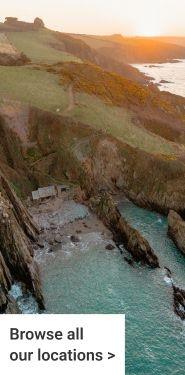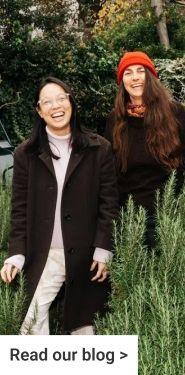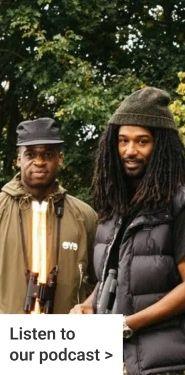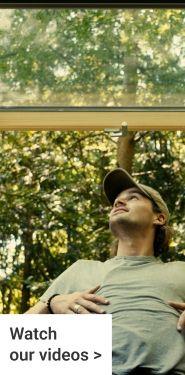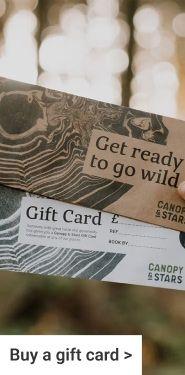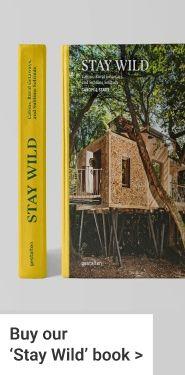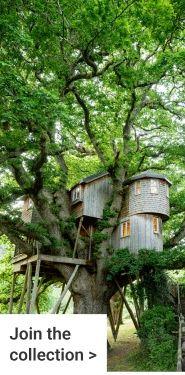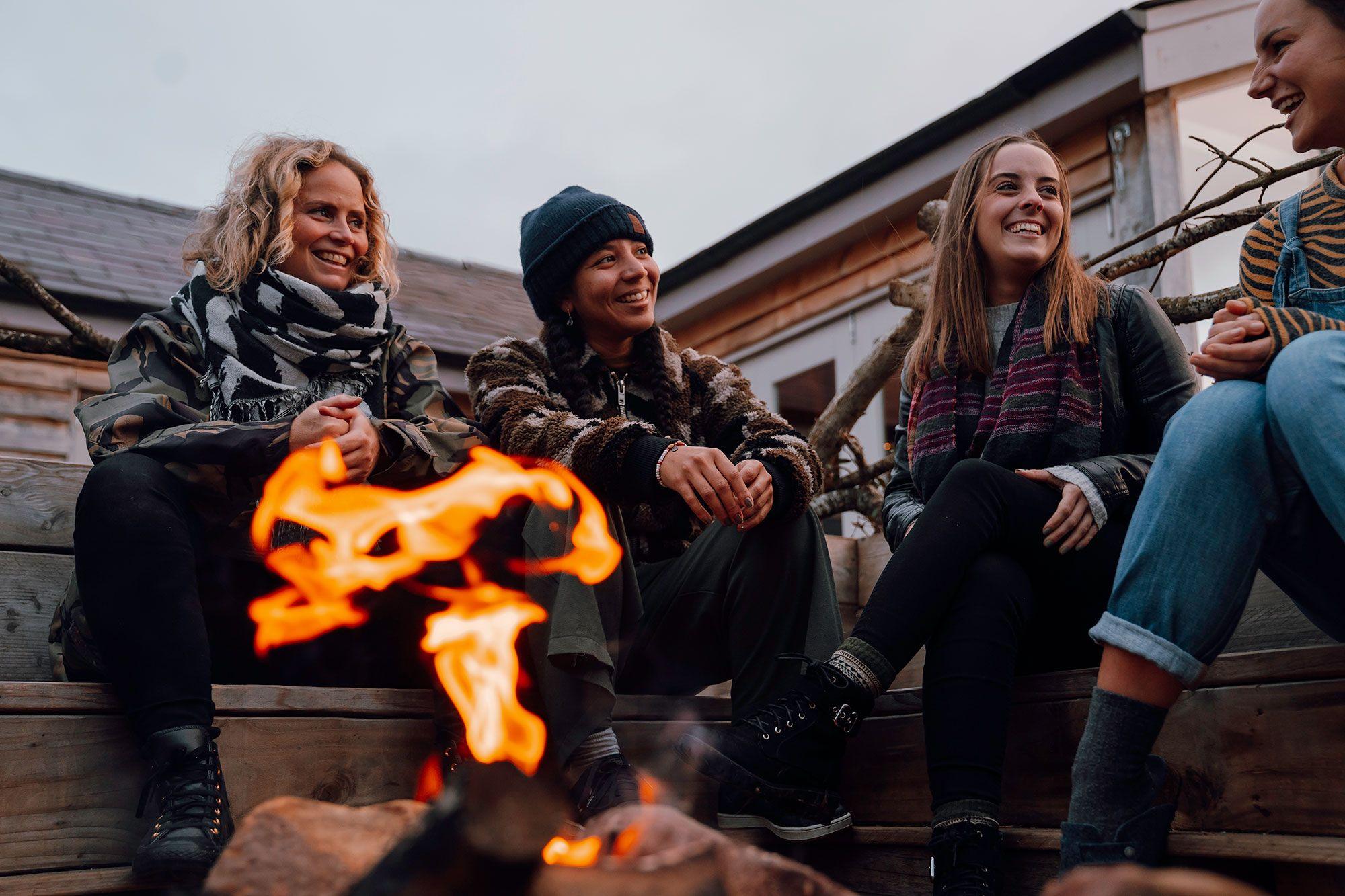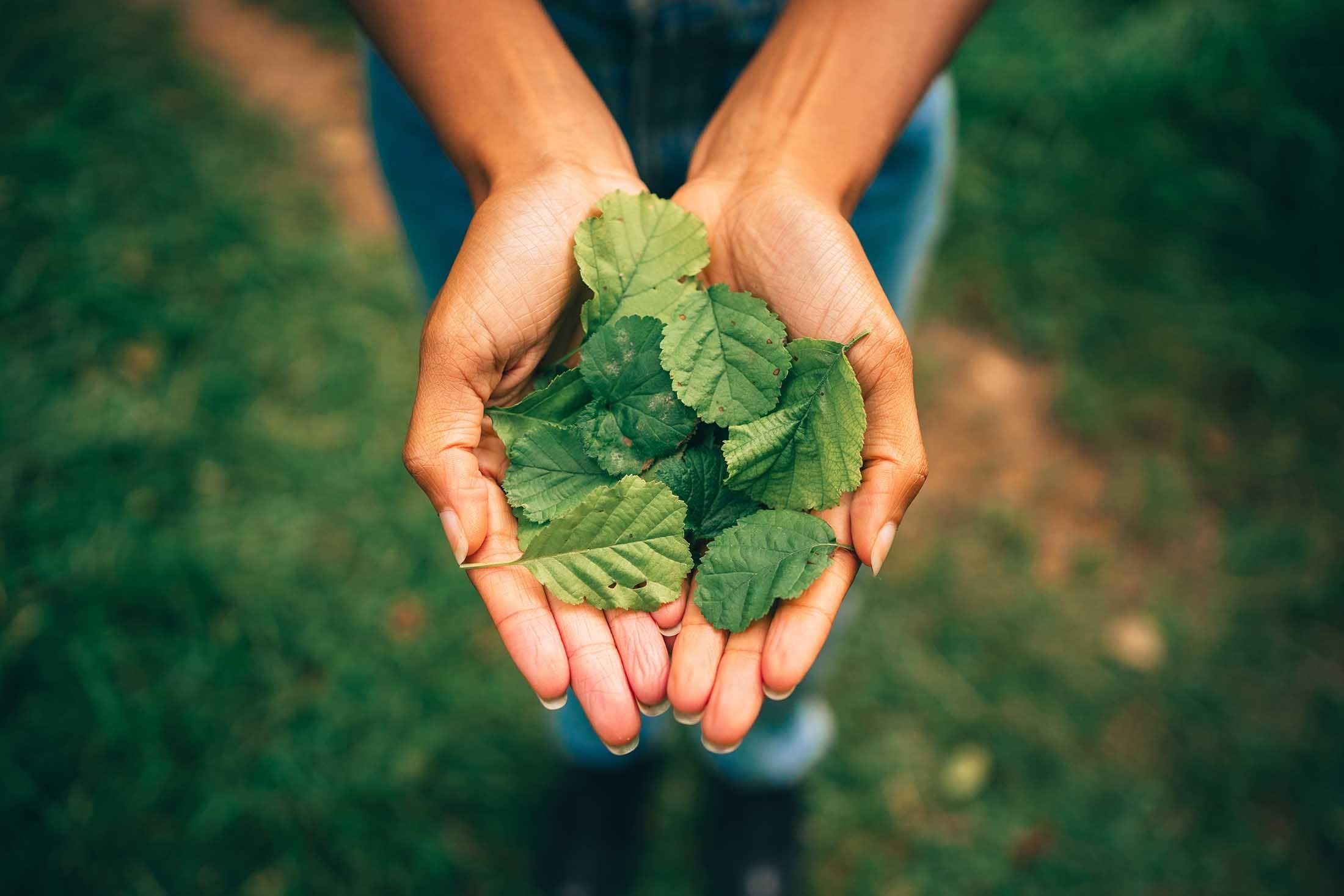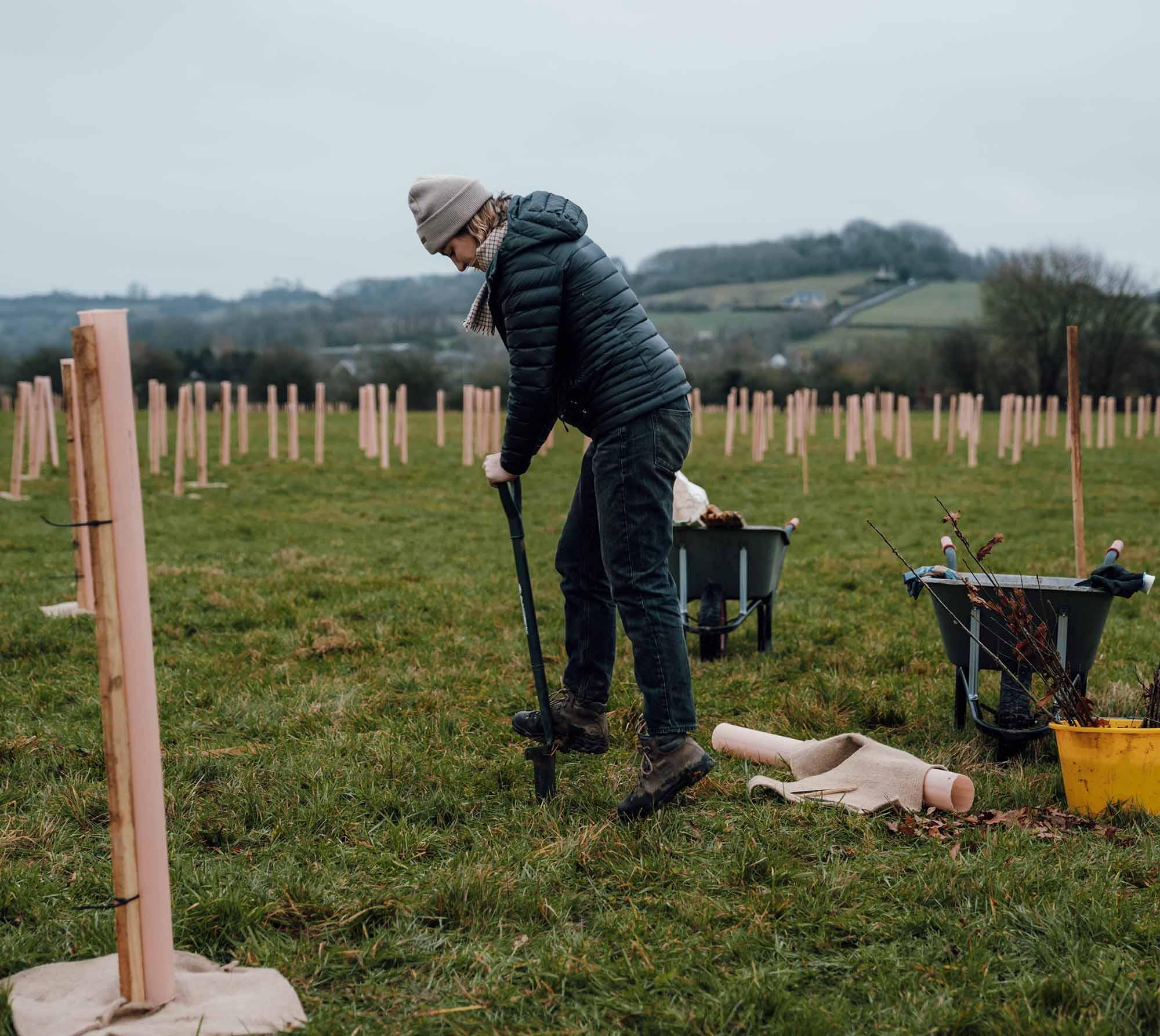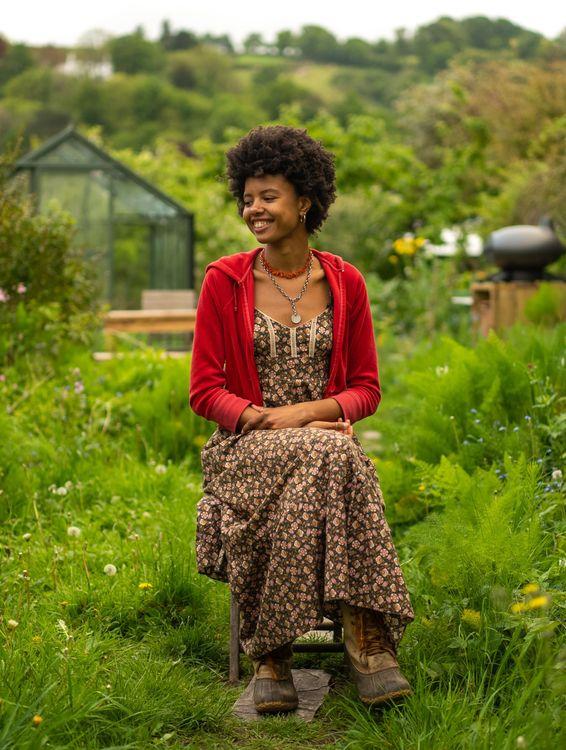
A Life More Wild - Series 2 Episode 4
Poppy Okotcha & Tom Hunt
Potting and pottering with Poppy Okotcha
Episode four of A Life More Wild finds us heading to South Devon to hang out with trained horticulturalist Poppy Okotcha. Poppy is an ecological grower and passionate advocate for reconnecting to nature through our food. A few years ago, she turned away from a career in modelling, in search of a less hectic, more thoughtful life. Since then, her books, public speaking and social media channels have become an inspiration to many, many people. We join her and 'the ladies' - her two hens for wander and a bit of seed planting. Later on, we chat to chef and food educator Tom Hunt about sustainability and seasonality.
So I understand these chickens are called 'the ladies'? They're very talkative.
Sometimes I feel like they're having a proper gossip. And then sometimes I feel like they're just sort of, comforting each other? Like when I say Hello, ladies, it's sort of like they're just doing something similar. They're just going like humming almost.
So, Poppy -- where are we right now?
We're in my garden in South Devon. It is an average size for the UK. It's got really old stone wall on the right-hand side, which we're not sure, but might be medieval. And we like to think it is because that's romantic. It's really beautiful, but home to armies of slugs and snails, which is why the chickens are here, which you can hear. So, the garden is right in the centre of town, but it is really open, we can see the hills in a distance, big green rolling hills covered in trees. There's often sheep up there in the spring and summertime. It's a little kind of oasis in the hustle and bustle. We're just off the high street. So, it's lovely and peaceful here and full of green. This garden was super wild when I arrived a year and a half ago. So the process of gardening here has been really about trying to be sensitive to that. And observe the different creatures and plants that are already here. I'm growing vegetables. There's some apple trees, the chickens are here, I've got a greenhouse. And then at the very beginning of the garden, there's an area which is going to be grown as a kind of perennial growing system with edible and medicinal plants, that are really beautiful. A pond, lots of space for habitat, plenty of nettles. We're going to walk down the garden paths of veggie patches to the apple trees, past the compost and the chicken ladies and into the shed to sow some seeds.
You've mentioned you were working as a model, why the change?
I was working in fashion and trying to figure out how I could exit fashion and start doing something that I thought was good for, not just me, but for other people and for the planet. And as I was getting more interested in food and growing food, I was like, well, maybe this could be what I do. At that stage. I just had some like radishes in the container on the balcony in London and like a couple of houseplants that I was looking after. But I suppose growing up gardens and being outside, and plants was like, always a big part of our life. My mum did a lot of gardening, and she suffered with mental health. And I saw how incredibly healing tending a garden was for her, and also how bonding it was for our family. Like digging a pond and finding a frog there. And so I think those are some of the like, most transformative moments of my childhood, I suppose, seeing how powerful this stuff is. And it's so mundane. But as I was getting more interested in food and growing food, I was like, well, maybe this could be what I do. It seemed like in a way, sort of the most important thing about life, food, because we need it to survive. And the way that it's produced has such a huge impact on our physical and emotional wellbeing as well as the environmental wellbeing. It felt like going all the way back to stage one. Like if we can't feed ourselves well. It's really hard to do the rest of it well.
And where are we headed now?
So we've wiggled down the length of a garden gone past the veggie patches and little chicken ladies and now we are in the potting shed where I do my seed sowing. Oh, and we've arrived to discover that somebody has been here before us and eaten the lettuce seedlings which is very sad. So, I'm gonna have to move these. I think that was probably Mr Slug. Everyone's got to eat.
Could you describe what we're looking at in here? Why's it special to you?
I love it in here. It's a really old stone structure. Similarly to the wall, I like to think that it is very ancient. I don't know if that's true. I've got baskets hanging from the ceiling, and calendars and tools hanging on the walls. And then I've got my bench for my seedlings. It smells warm in here, most of the time, because of the glass roof. It's not usually damp smelling, I suppose it's sort of a dry warmth, the stones heat up and it smells really lovely. And then also the smell of compost, which I often store in here. So as my seed box, so I keep my seeds in a sewing box, which I really enjoy the pun involved with that, because it's a sewing box with needles and thread. But I take my seeds out of it. It's a really fab way of organising things because it opens up into these different tiers. I really like old things, I really like reusing bits and bobs. So, this was an eBay find, and it works really well. So, these are some tomato seeds that I was given by a friend. And I'm just going to put a couple in each module. When I say a couple, I mean four. And then I'm going to send them out once they've germinated. And then I'm just going to push each seed down into the compost. So, that it's got really nice firm contact. And then just going to spread what's left of the compost over the top of them. So, they're nice and snug in their little homes.
You seem almost more excited by the seeds than the plants!
We don't often get to interact with seed a great deal if we don't grow our own food or grow anything at all. And I think it's really nice to experience this kind of quiet life stage in a plant's existence. Seeds are super cool, because they are actually respiring -- so there's oxygen going in and out of there. They're not entirely dead, or inert -- like a pebble, although they kind of look it. So, they're kind of like in this really deep meditation, like Zen monks sort of hovering somewhere between life and death, and then all the potential for life is held in there. So, they don't actually need nutrients to get them going in the very beginning, they germinate and grow for a little bit, without needing anything because all that goodness is packed inside that little seed. And when you see like poppy seeds, which are teeny teeny tiny. They you know, it's incredible that they've got all they need in that tiny little bundle. And the other incredible thing about poppy seeds is that they can survive for about 50 years dormant, just waiting to germinate. Seeds, I love them.
How did you get into all of this though? I'm guessing the interest didn't grow out of nowhere -- pardon the pun.
Before moving to South Devon, I was living in London, I was living in a flat with my partner at that point, we had a little balcony. And yeah, it was growing some radishes, believe we had a jasmine there as well. And that was all in containers, that was a really nice experience. Because I suppose when you first start getting into growing, having a whole garden can be a bit overwhelming. So, I actually do think in a funny way, starting in containers and pots and small, small spaces is the best entry point into growing. So, following that I was then living on a canal boat in London, on the canals. And I started growing in containers on the roof and on the deck, and plants inside the house. And very quickly it came a kind of floating vegetable garden. And yeah, and again, it was sort of learning how to grow in a really controlled environment, which I think is really helpful at the very beginning. Because obviously if you're on a boat, there's not going to be like slugs and snails because how do they get to you -- they can't.
So, it was a really nice introductory where everything went fairly smoothly. And I suppose I wasn't hit by the kind of the sorrow and heartbreak that so many beginner growers are hit with when, the natural world does what it does, which is eat each other. And eventually, as time passes, you start to kind of come to terms with that. And I suppose you become more resilient really. I think one of the great things about gardening is that you start to understand the cycle of life and death, in a very different perspective than we are sort of sold it from our sort of culture. Rather than it being this really terrifying, awful, gory experience that we don't talk about, it becomes really central to a healthy growing space. So, for example, composting that's all about death and decay. But if you don't do that, it's really hard to maintain healthy soil -- pretty much impossible. And if you can't have healthy soil, you're not going to grow healthy plants and healthy plants get hit by pests and disease so much worse and it's not as good for us. So, I suppose pests and death and decay in a garden has this like amazing kind of teaching, I suppose, which I didn't get until a bit later in my growing experience.
I'm really looking forward to sowing these seeds because these were given to me by a friend. She saved them from her squash plants last year. They are BonBon squash, which I've never grown before. And she's drawn a little picture on the seed packet to illustrate what the variety is. They're really beautiful, big kind of pearly white seeds almost the size of my thumbnail, really, I think seeds are just so beautiful, when you kind of stop to look at them. I mean, they're literally glowing in the sunshine right now. So, I guess seed is part of a bigger story of a garden, part of a bigger story of how we feed ourselves. It's essential -- like plants are autotrophs, at the bottom of everything. They grow themselves from nothing, essentially. And so, we're all dependent on them for our survival and seeds is a really big part of that lifecycle of a plant. Things go in circles come back around death and decay happens for new life. And I think that's a really important thing to understand.
How do you think that philosophy translates to the world at large? How could we see that in our daily lives?
When we start to try and live more sustainably, circular thinking is really central to that. If it's not circular, that's when you have stuff like landfill, that's when you have stuff like waste. In a healthy ecosystem that doesn't exist, and when you try to grow in a sustainable way, you're trying to mimic that you can't help but try and mimic it in your day-to-day life, as well. So yeah, I think that it really has become like I suppose a religion, a religion for me, it's not just like, 'ah sowing seed. That's nice.' It's like trying to really inspect the whole process and what I can learn from it. Yeah, its this sort of remedy to the fast-paced life that we live now that can be so hurtful for both us as individuals, but also like on a global scale? Like you know, there's a problem. Everything needs to be able to transform. Yeah.
The hens are just making a dash for the vegetable patches, so I might quickly going to bring them over here, herd them. Come on, come on, come on. Good girls....
That was Poppy Okotcha, potting and pottering, in Devon.
Just down the road in Cornwall. Chef, writer and climate change activist, Tom Hunt, has gone off grid in the countryside. We briefly dragged him back online, to discuss the difficulties of eating sustainably and seasonally. His food education campaigning, and a couple of simple wild recipes.
So, tell us where you are right now? Where are you sitting, what are you seeing?
I'm in Cornwall, just outside Newquay. Uh I'm in a box! So, I'm not seeing much at all other than some soundproofing.
And where are you based in Cornwall, normally? You have a fairly wild existence there?
Yeah, so, we are currently living off grid in a field by a river, which is, in this beautiful valley, which is like an amphitheatre for birdsong. So, there's I don't know how many species of bird, just kind of dawn and dusk, singing and it's really beautiful. Although the turkeys and cockerels are a little bit much.
And is it completely off grid? Are you washing clothes on the stones in the river?
Well, some of them! But no, this space is completely off grid. So, there's no mains electricity, plumbing, water or gas. But we've got a solar panel and little battery to provide us with some electricity. So far, we've only really used it for toothbrushes and phones. It's amazing actually, when you put yourself in that situation, how kind of, much less resources you tend to use, when they're not readily available to you. So, I'm like doing that, when it comes to washing up, I'll do the first wash in the pasta water. And then I'll use the river water for the second wash. Do you know what I mean, so and so it's really kind of just minimising our output as a family, but it's fun. It's really fun. I mean I'm quite fortunate because, I've kind of done this my whole life, since I was 18, 17, 18. When I first kind of started touring the British music festivals with this great organic cafe called Henry's Beard, which still, kind of, travels around today, living like travellers. Travelling from one festival to the next building benders, which are like, essentially, homemade dome tents made out of coppiced Hazel wood, and old tarpaulin or whatever tarpaulin you have to hand, and remembering now the first thing I lived in was this very hobbity Bender that was quite tiny with a log burner that just bellowed smoke backwards into the tent, with pallet flooring. And anyway, I upgraded I think after a little while to the yurt which I made the following summer. And I've done that again and again, throughout my life. So, I lived on a permaculture farm just outside Bridport in Dorset, called Ourganics for a while.
So it sounds like you always had this enormous sort of connection with food and, and nature in the outdoors in a sort of very embedded way.
Yeah, I mean, it's a cliche, but I loved cooking with my grandma. And we'd, you know, flip pancakes on Shrove Tuesday and go around there for her roast dinner of kind of -- kind of pressure cooked boiled carrots and lovely lamb and mint sauce each Sunday. Then when I first worked at Henry's Beard with the chef, Ben Hodges, he was just the most inspiring person. And we became quite close friends. And I learned so much off him, about or from him, about food. His brother at the time was opening Morrow with Sam, and Sam Clark in London. And they both previously worked at River Café, in Hammersmith. So, they had this really strong background in, proper cooking, like seasonal cooking, with Ray and like, with this emphasis on good quality ingredients. And so, as a kind of a young person, who was interested in ecological issues and organic food, like that kind of fitted with me quite well. I actually studied Fine Art at Yeovil College, and then Falmouth. And I've just seen recently, a lot of artists working with food, covering similar subject matter to what I try to work on and communicate through my food, writing and recipes.
How would you sum that up? What would you call 'your message' if that's not too grand?
Well, I would kind of default to my food sustainability philosophy, which have been developing over the last 10 years called, Root to Fruit Eating, which to cut a long story short, started in 2011, when I was asked by Tristram Stuart to feed 200 people using food waste. Which I saw as this kind of huge opportunity, to start talking to people about these broader issues of foods relationship with the climate crisis. And so coined this term root to fruit eating, which I then evolved into a more complex and broad manifesto, for Eating for People Pleasure & Planet, or Pleasure, People and Planet, which is the title of my new cookbook or new, I say it's new, it's two years old now, which is not new in terms of the book world. But yeah, I think we've become disconnected from the origin of our food. And ultimately, nature, because of the food system that we've created. The kind of Western
evolution of consumerism, and how we really, well, and how we consume, through predominantly supermarkets, which are kind of huge warehouses, full of at least 80% processed foods, that are hugely disconnected from nature. You could argue, actually, you know, that, you know, the fact that they're even wrapped in plastic, is a, you know, metaphor, for its separation from nature. And so, yes, a lot of my work and the kind of core idea behind what I do is about really trying to reconnect people with nature, through the medium I know which is food.
I've seen you talk a lot about whole foods as well. And it occurs to me that it's one of those phrases I've seen written I've seen talked about -- there are shops called it. I don't actually know what it means.
Yeah, well, I guess it's one of those things. People have different definitions for things don't they, like zero waste means different things to different people. Even organic, can mean different things to different people. But yeah, I mean, whole foods are essentially unprocessed foods, in my opinion, starting with fruit and vegetables, but then also, kind of looking to whole grains as well. So, when I say eat whole foods, to begin with, what I'm talking about, is actually practising zero waste, or what I like to call root to fruit eating, or complete consumption. So, eating the whole ingredient, so if it's a bunch of beetroot, then eat the stems and leaves and the skins, if it's carrots, use the leaves and the stems, as well as the orange part. And I guess what I, what I'd like to kind of follow that up with is that, if you're going to create a kind of healthy foundation of good food that is good for personal and planetary health, starting with a kind of, seasonal, whole, kind of box of fresh fruit and vegetables and grains and legumes, is like, you know, where we begin. Sadly, though, the reality is the cheapest way to eat, out of anything, is hyper processed, ultra cheap, frozen bags of carbs and bits and bobs. That's another issue altogether. I think which is about kind of, yeah, poverty in Britain.
Yeah. So how hard is it for you, or for people generally, do you think to strike that balance between sustainable eating and affordable eating?
It can be incredibly hard, you know, with the cost of living crisis. It's, it's really tough. I mean, people having to live from food banks, and the government system for benefits is really, really hard.
It's obviously, it occasionally feels so much like a sort of privilege to be able to even think about these things. And to be able to think, well, where should I buy? How should I buy? How shall I eat? But is there one thing that you think, if you just do this, it will make a difference. And it's affordable and accessible?
Yeah, well, reducing food waste, is the kind of most accessible thing that we can do to reduce our impact environmentally, but also save us money. Eating a plant rich diet, and eating whole foods also saves us money. I think it, really starts with this kind of root to fruit eating and waste reduction, and a focus on whole plant foods. But, if you can't afford to make that leap, to shop at farmer's markets, or shop organically, simply doing those two things, reducing your food waste, and eating more plants, when you're eating from the conventional food system, has an incredibly positive impact on personal and planetary health.
So do you have a particular time of year you look forward to or a particular even individual thing that you think, great that is now coming into season.
I don't have a one favourite ingredient because I'm a seasonal eater, and because I'm always kind of like trying to discover something new. But having said that, as a seasonal eater, you're always dying for the next ingredient to come and become available. So, at the moment, I'm just devouring asparagus, when it's fresh, and in season, it's, well, it's flavour is vibrant, I would say and it barely needs cooking for more than a couple of minutes. And it's ready. I've just written a couple of articles actually, about using the whole stem because of course when we're throwing away, or at least a third of the base, that's kind of good money in the bin and asparagus is expensive. So, if we're going to eat it, we should eat the whole thing. If they're fresh, often the outside isn't so wood-y, but never just snap. A lot of guides tell you to snap the asparagus, and wherever it breaks -- that's the kind of where to eat it from, and to discard the base. But that really just, wastes loads. So, what I suggest is, cutting off a little disk from the bottom, and trying it, and if it's very fibrous, you can peel the very end if you need to, but often you'll find you don't need to peel so much. And then you can cut it into coins or little kind of disks and use it in a slaw or a stir fry. Often a really common recipe is a kind of soup, which is yeah, really green and delicious.
I was also wondering how you use carrot leaves. You mentioned that earlier?
Yeah, carrot leaves are really quite bitter, so they need to be used sparingly, but they're very nutritious. I think they've got more vitamins in than the roots themselves. So, I always suggest using them in green sauces, essentially. So, anything from chimichurri to salsa verde, but to use them in a ratio of no more than 50/50 with other herbs, because they're bitter flavours.
So, what's coming up in the garden at the moment?
Well, we've actually, just, laid down our no dig bed, because we're in a field and a new space. We've just kind of created it. So, to kill off the grass, we've mulched it with cardboard and then made a small bed and filled it with, well, quite a few things. Actually. We've got lots of corn, runner beans, some herbs, rosemary, sage and oregano. Lots of marigolds, beetroots, like so many things actually. Who knows what will grow!

